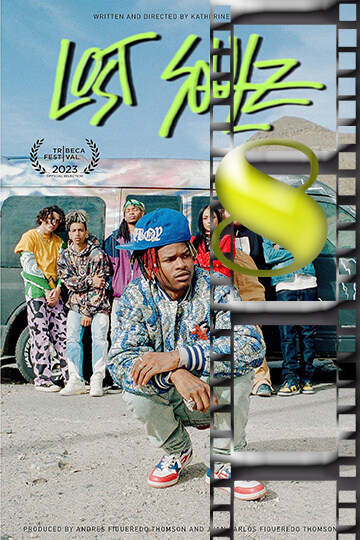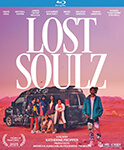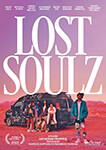



What’s It About
Sol (Sauve Sidle) is an aspiring young rapper living with his best friend Wesley (Siyanda Stillwell), whose family has embraced him as a brother. After a raucous night causes Wesley to overdose, Sol abandons him at a house party, and eventually chooses to leave home for good and join a touring group of hip-hop artists. As they travel across Texas creating and performing, he discovers who he is as an artist and person.



MOVIESinMO REVIEW
“Lost Soulz” is one of the year’s most compelling character studies, powered by kinetic turns from Sauve Sidle and breakout find Krystall Poppin. Director Mason Webb’s loving portrait of embattled artists trying to survive in Atlanta’s rough hip-hop environment gives a shockingly authentic retelling of an all-too-familiar tale. The movie tracks Cairo (Sidle), a talented yet troubled producer who is hustling within the underground music world despite personal demons. His serendipitous meeting with Destiny (Poppin), a poet with a lyric voice reluctant to expose herself to the world, puts them both on a collision course of artistic partnership and self-discovery. Their artistic partnership evolves amidst systemic challenges, the manipulation of the industry, and the burden of their pasts. What distinguishes “Lost Soulz” right away is its avoidance of mythologizing adversity. Webb’s camera records Atlanta in lived-in realism—everything from fluorescent-lit bodegas to makeshift home studios in small apartments. The film’s visual vocabulary shifts seamlessly between documentary-surveying observation and expressionist set pieces that externalize our heroes’ emotional lives. A stunning sequence follows Cairo through a panic attack evoked by a dizzying spiral of sound and image that pulls viewers in directly into his anxiety. Sidle delivers a performance that will be the highlight of his career as Cairo, alternately charming and explosive, with breathtaking subtlety. His character’s self-destruction never feels false but springs logically from internalized trauma masterfully reeled back in the script in measured disclosures. But it’s Poppin who’s the revelation of the film. Her Destiny evolves from reserved introvert to forceful presence with effortless naturalistic ease that her final artistic coming-out feels genuinely earned and cathartic. The film’s questioning of Black creativity in the context of commercial demands is especially timely. A showdown with a record producer midway through (acted with smoothly slimy ease by veteran character actor Keith Williams) brings the tension between expressive honesty and marketability into crystalline focus. “Why y’all always gotta make it so heavy?” he scoffs disdainfully at their politicized rhymes. “No one just wanna dance.” This exchange encapsulates the film’s complex analysis of how Black artists are compelled to navigate the demand either to entertain or to instruct, rarely given license to create simply on their own terms. Webb’s finest work is in the music numbers, where the camera is another instrument in the orchestra. The highlight of the movie—a seven-minute unbroken shot of Cairo and Destiny composing their signature song—gives the rare cinematic experience of musical creation that feels like seeing inspiration unfold in real-time rather than a montage of artificial “eureka” moments. The rest of the cast provides rich depth to the world here, particularly Regina Torres as Destiny’s abuela, whose initial wariness of Cairo gives way to one of the film’s most poignant relationships. Their scenes together—wordless dinner encounters more often than not—tell us volumes about intergenerational bond and the healing potential of found family. If the film falters, it’s in its slightly predictable third act, when industry politics and romantic complications threaten to overwhelm the more distinctive character work. A subplot involving a rival producer feels particularly underdeveloped, existing primarily to generate outside conflict when the inside conflict was already compelling enough. The script also overuses expository dialogue at times when its visual storytelling is more than able to convey emotional subtext. Cairo’s monologue concerning how his father’s musical aspirations were unsuccessful, for instance, spells out themes which had already been sweetly established by more subtle means. These missteps aside, “Lost Soulz” is an important addition to the film representation of Black musical culture today. It joins films such as “Hustle & Flow” and “Straight Outta Compton” in critically exploring hip-hop culture with authentic respect for the art form and critically engaging with the systems that facilitate and take advantage of its makers. The sonic context of the film is worthy of its own attention. Music supervisor Amara Davis has created a soundtrack that is more than support or accompaniment, but the architecture of the narrative. The musical arc of Cairo and Destiny, from rough, unadulterated sounds, to layers of production, parallels their own individual evolution without sacrificing the realities of who they became and what rallied them in the first place.Webb’s visual pallet never diminishes Black cultural specificity and identification – I never felt Webb’s direction begged for us to take a pause, or needed us as audience to understand. McCoy’s, and Webb’s, trust in their audience to know the cultural references and to see how community is sometimes a vital part of the identity, feels like a radical act in an industry that so often images Black stories for a presumed white gaze. “Lost Soulz” ultimately succeeds because it engages its characters as full human beings and not as symbols. Cairo and Destiny’s artistic aspirations are not detachable from themselves, traumas, and communities. Their music doesn’t present as an escape from their condition but as a straightforward response to and exercise through their lived lives—a phenomenon with which many Black artists are acquainted and whose creative work is inextricably entangled with personal and communal history. By the film’s end, Webb has done something so uncommon: a music tale that understands why we need art in the first place. The final shot—a performance that is both a professional milestone and personal freedom—reaches us because we’ve witnessed every step of the difficult path that brings us to this moment of transcendence. “Lost Soulz” reminds us that authentic artistic voice isn’t found in spite of our challenges but through them. It’s a film that is an ode to the complexity of Black artistic voice and still manages to leave us with a universally human story about being discovered through collective art. With its sometimes convenience-based plotting, it is still one of the year’s most genuinely emotional explorations of artists fighting to be heard on their own terms.
OUR RATING – AN URBAN REALITY 8
MEDIA
- Genre – Drama
- Street date
- Digital/Blu-Ray/DVD – June 4, 2024
- Video – 1080p
- Screen size 1.85:1
- Sound – English Dolby Atmos
- Subtitles – English SDH, Spanish, French
Extras
- Audio commentary by director Katherine Propper and star Sauve Sidle
- Katherine Propper’s short films
- Street Flame (2019) and Birds (2021)
- Deleted and Extended Scenes
- Theatrical Trailer

